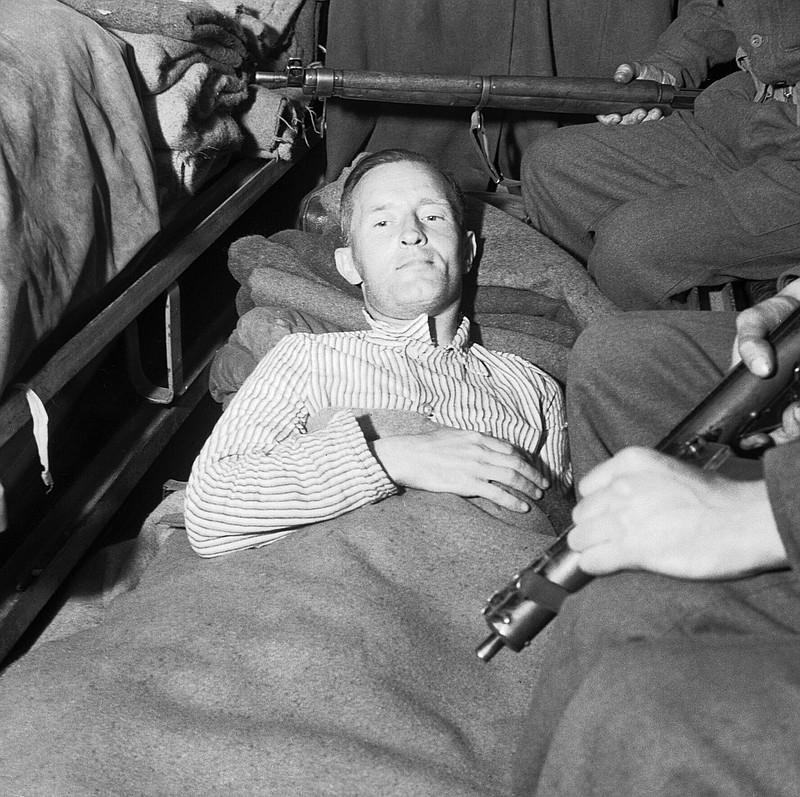The name William Joyce is not well known by this generation. However, British citizens living during the Battle of Britain from 1939 to 1945 would readily identify him as "Lord Haw Haw," whose voice came across the airways from Hamburg, Germany, spreading propaganda for Adolph Hitler's Third Reich.
Barbara Hurst, a retired speech pathologist and resident of Signal Mountain, recalls growing up in London and hearing her parents ridicule the voice of "Lord Haw Haw." World War II veterans from Tennessee and Georgia serving in Great Britain heard with resentment and disdain "Lord Haw Haw's" broadcasts.
Joyce was born in Brooklyn, N.Y., of British parents. When he was 3, the family moved to Galway, Ireland. As a teenager, Joyce was alleged to have been an informant for the British military forces on the activities of IRA rebels. Joyce was also an avowed fascist. To avoid detention by the British, he fled with his wife, Margaret, to Germany in August 1939.
Joyce became a naturalized German citizen and a broadcaster in Berlin for Joseph Goebbels' Ministry of Propaganda. His weekly messages were beamed by direct transmission to England and by shortwave to the United States from September 1939 to April 1945.
Joyce sought to demoralize the Allied troops, minimizing the success of the Allies and overstating the effectiveness of the Nazi war machine. When the war started to turn against Germany, Joyce encouraged a peaceful resolution allowing the Nazis to remain in power.
Several commentators spewed Nazi propaganda, but Joyce - with his twangy nasal drawl and British accent - was the most notorious.
More than 6 million listeners reportedly tuned in each week to "Calling From Germany." Many hoped to pick up information about a family member possibly captured and imprisoned in the Third Reich. Others viewed Joyce's broadcasts as humor because of his exaggerated pro-Nazi positions.
Joyce was brutally critical of Prime Minister Winston Churchill and regularly espoused anti-Semitic remarks, claiming that the Aryans suffered while Jews prospered from the war.
Joyce's last program was aired from Hamburg on April 30, 1945. Rambling and audibly intoxicated, he chided Britain for pursuing the war beyond mere containment of Germany and warned of the menace of the Soviet Union. He ended: "Heil Hitler and farewell."
Shortly afterward, British forces spotted a disheveled figure gathering firewood near the German border with Denmark. Joyce reached in his pocket (not for a weapon but for a false passport), and he was shot in the leg.
He was taken to London's Old Bailey (the central criminal court) and charged with three counts of high treason. He was acquitted of two counts by the jury upon instructions of the judge and by agreement with the prosecution.
On the third count, Joyce was convicted of making a false statement about extensive damage and destruction on two British cities (Folkstone and Dover) by German bombers during September and October 1939. In reality, these raids did not start until December 1939.
Joyce's defense argued that the court lacked jurisdiction: He was born an American citizen, his parents were British, and he had become a naturalized German. He could not be convicted of treason against Great Britain. The prosecution refuted that argument: Joyce had lied about his nationality to obtain a British passport on July 1933 and voted in elections in Britain. The court ruled that Joyce owed allegiance to the king and could be punished for treason.
After exhausting his appeals rights through the English court system and the House of Lords with one of five justices arguing that he was not guilty of treason, Joyce, age 39, was hung at Wandsworth Prison on Jan. 3, 1946.
A transcript of the proceedings titled "The Trial of the William Joyce" by William Hodge and Co. Ltd., London (1946) provides an excellent presentation of the evidence and testimony, arguments of counsel and rulings by the court in an accurate depiction of the English system of justice following World War II. The issue of whether Joyce's punishment was excessive for a noncombatant exercising free speech for a foreign power is actively debated today.
Two outstanding post-war movies contained speeches by "Lord Haw Haw." "Twelve O'clock High" (1949) starred Gregory Peck and Dean Jagger and told of U.S. aircrews flying daylight bombing missions over Nazi Germany. "The Dirty Dozen" (1967) featured Lee Marvin, Telly Savalas, Jim Brown and Ernest Borgnine in a top secret mission before D-Day.
Jerry Summers is a partner with Summers, Rufolo & Rodgers. Mickey Robbins is an investment adviser with Patten and Patten. For more, visit Chattahistoricalassoc.org.
